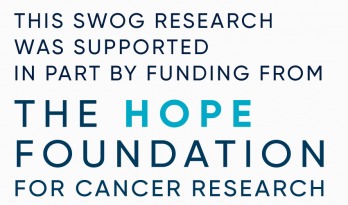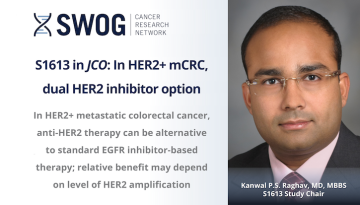
Women at Higher Risk of Severe Adverse Events
Past research has shown that women tend to have more side effects, or adverse events, from chemotherapy than men. Now a team from the SWOG Cancer Research Network that analyzed data on more than 20,000 patients from more than 200 clinical trials reports that women also have a higher risk of severe adverse events from two other major modes of cancer treatment – targeted therapy and immunotherapy. The results are published in the Journal of Clinical Oncology.
Overall, women had a 34 percent higher risk of severe toxicity than men. Their risk was higher for all three forms of therapy, particularly for immunotherapy, where it was 49 percent greater than it was for men. The researchers say their findings support the idea that sex may independently modulate drug toxicity.
|
SWOG biostatistician and health services researcher Joseph Unger, PhD, of Fred Hutchinson Cancer Research Center, led the work. "It has been understood that women have more toxicity from chemotherapy than men, but almost no research has aimed to understand whether that pattern held for novel treatments like immunotherapy or targeted therapies,” Unger said. “We found similar large differences, especially for immune treatments.” |
|
The analysis was supported by the National Cancer Institute (NCI), part of the National Institutes of Health (NIH), and was conducted by SWOG, which is part of the National Clinical Trials Network (NCTN) and the NCI Community Oncology Research Program (NCORP).
The researchers analyzed data on 23,296 patients who had enrolled in 202 cancer treatment trials run by SWOG during a 30-year period. Patients on such trials are regularly checked for adverse events (AEs). More than two-thirds of these patients had been treated with chemotherapy, and the rest had received either targeted therapy or immunotherapy. Collectively, they had experienced 274,688 AEs, and 15,051 patients, or 64.6 percent, had experienced at least one severe AE – a grade 3 or higher toxicity.
The researchers classified the AEs into two broad domains: symptomatic AEs (such as pain or nausea) and objectively measured effects such as high blood pressure (objective AEs). Objective AEs were further categorized as hematologic (related to blood or bone marrow) or nonhematologic.
Women had a higher risk of severe symptomatic AEs and severe objective hematologic AEs compared to men. For severe objective nonhematologic AEs, researchers found no statistically significant differences in rates of occurrence between the sexes. Women also had a greater risk than men of experiencing five or more severe AEs.
The authors say differences between women and men in the toxic effects from treatment may be caused by a range of factors, including differences in how women and men report their symptoms, differences in how their bodies process medications, and differences in how therapies are administered to them.
Identifying sex-related differences in treatment toxicities could lead to the development of sex-specific interventions or to changes in how – or how much – treatment is given.
“Increasingly, treatments for cancer will be more individualized for patients,” Unger said. “These findings indicate that patient sex may be an important consideration for individualized treatment, including for novel new treatments like immunotherapy.”
This work was funded by the NIH/NCI through grants CA180888, CA180819, and CA189974, and in part by The Hope Foundation for Cancer Research.
In addition to Unger, the study team included Riha Vaidya, PhD, of SWOG Statistics and Data Management Center; Kathy S. Albain, MD, of Loyola University Chicago Stritch School of Medicine; Michael LeBlanc, PhD, of SWOG Statistics and Data Management Center; Lori M. Minasian, MD, of National Cancer Institute Division of Cancer Prevention; Carolyn C. Gotay, PhD, of University of British Columbia; N. Lynn Henry, MD, PhD, of University of Michigan; Michael J. Fisch, MD, of AIM Specialty Health; Shing M. Lee, PhD, of Columbia University; Charles D. Blanke, MD, of SWOG Group Chair’s Office; and Dawn L. Hershman, MD, MS, of Columbia University.
Reference:
Joseph M. Unger et al. “Sex Differences in Risk of Severe Adverse Events in Patients Receiving Immunotherapy, Targeted Therapy, or Chemotherapy in Cancer Clinical Trials.” Journal of Clinical Oncology, published online February 2022. https://ascopubs.org/doi/abs/10.1200/JCO.21.02377
Other Recent Stories



